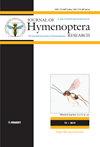An秘鲁北部森林Trigona属无刺蜜蜂(膜翅目,Meliponini)的最新分子系统发育
IF 1.4
3区 农林科学
Q2 ENTOMOLOGY
引用次数: 0
摘要
无刺蜂(膜翅目,Meliponini)是一个庞大而多样的群体,现有59个类群,代表了亚马逊森林的主要传粉者。其中,Trigona属是新热带Meliponini属中最大的特有种之一。在这项工作中,我们更新了Rasmussen和Camargo(2008)提出的Trigona的分子系统发育,包括2020年在秘鲁北部森林采集的59个新标本的数据,通过多基因系统发育方法结合了四个基因片段(16S, ArgK, EF-1a, opsin)的序列。我们的结果证实了Trigona和所有提出的亚属的单一性,除了Aphaneura。此外,大多数Trigona属属属属属群呈单系进化,而“刺”属和“淡”属分别呈副系进化和多系进化。此外,“fulviventris”物种群的内聚也受到了T. williana(之前被归为“pallens”类群)的影响。最后,我们提供了进一步的证据,证明秘鲁北部亚马逊地区的鬣蜥在地理上被划分为两个不同的分支,这突出了新热带生物地理屏障在Meliponini分化和进化中的重要性。最后,为了避免对Trigona标本的误认,我们讨论了对Trigona全属的枝系划分方法进行强有力的分类修订的必要性。本文章由计算机程序翻译,如有差异,请以英文原文为准。
An updated molecular phylogeny of the stingless bees of the genus Trigona (Hymenoptera, Meliponini) of the northern Peruvian forests
Stingless bees (Hymenoptera, Meliponini) are a large and diverse group including 59 extant groups, representing the main pollinators of Amazon forests. Among those, Trigona is one of the largest endemic genera of Neotropical Meliponini. In this work, we updated the molecular phylogeny of Trigona proposed by Rasmussen and Camargo (2008), including data from 59 new specimens collected in 2020 in the forests of northern Peru, through a multigene phylogenetic approach combining sequences from four gene fragments (16S, ArgK, EF-1a, opsin). Our results confirmed the monophyly of Trigona and of all proposed subgenera, except Aphaneura . In addition, most Trigona species-groups resulted monophyletic but the ‘ spinipes ’ and ‘ pallens ’ groups appeared paraphyletic and polyphyletic, respectively. Moreover, the cohesion of the “ fulviventris ” species group was hindered by the inclusion of T. williana (previously included in the “ pallens ” group) within this clade. Finally, we provided further evidence for a subdivision into two (geographically) distinct clades within T. guianae in northern Peruvian Amazon, which highlighted the importance of Neotropical biogeographical barriers in Meliponini divergence and evolution. Finally, to avoid misidentifications of Trigona specimens, the need for a robust taxonomic revision based on a cladistic approach of the whole genus is discussed.
求助全文
通过发布文献求助,成功后即可免费获取论文全文。
去求助
来源期刊
CiteScore
2.60
自引率
15.40%
发文量
68
审稿时长
>12 weeks
期刊介绍:
The Journal of Hymenoptera Research is a peer-reviewed, open-access, rapid online journal launched to accelerate research on all aspects of Hymenoptera, including biology, behavior, ecology, systematics, taxonomy, genetics, and morphology.
All published papers can be freely copied, downloaded, printed and distributed at no charge for the reader. Authors are thus encouraged to post the pdf files of published papers on their homepages or elsewhere to expedite distribution. There is no charge for color.

 求助内容:
求助内容: 应助结果提醒方式:
应助结果提醒方式:


